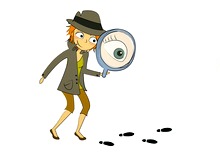| Back to Back Issues Page |
 |
|
English Detective, Issue #3 Goal Planning for success December 31, 2012 |
Your First Clue: Vocabulary we’ll Emphasize (Study Most) in this Issue
Week 1: achievement, attained, constraints, criteria, establish, expansion, goal, identify, image, jobs, labor (or labour- British English), objective, previous, resolution, resources, specific, target We also will study these related words not on the Academic Word List (AWL): accomplish, successful Week 2: attitudes, benefits, commenced, energy, eventually, financial, foundation, inevitable, location, priority, rejected, security Week 1
 The first week's study begins with a discussion about setting SMART goals. (That’s goals that are Specific, Measurable, Attainable, Realistic, and Timely.)
The first week's study begins with a discussion about setting SMART goals. (That’s goals that are Specific, Measurable, Attainable, Realistic, and Timely.)
You can practice with some of the words from that article here, then with a crossword puzzle. The answers are here. Finish the week reading about the common American New Year’s tradition of making resolutions , with suggestions for how you can try out this new year’s tradition by writing about your own goals or resolutions. Week 2
Practice the future tense (with a few more examples of resolutions.) There is more grammar practice with ‘will’ as well as other modal verbs. Then you can read a short essay about learning from failure and continuing on to success. It is based on selections from two famous graduation speeches. The essay also uses a very brief selection from Steve Job’s Stanford University speech in 2005. That whole commencement address will be one of the readings in the next issue, as it is in fairly simple English and contains so much to think about. So does Rowling’s speech, but it’s a little more difficult. I felt some might find it hard to understand, so I have just given the section about learning from failure. (If you would like to see or listen to the complete 2008 Harvard University Commencement Address by J.K. Rowling, it's linked from that page.) Practice vocabulary about success and failure. The page also links to an excellent short video about famous people who failed before they went on to succeed. Finally, there’s a quiz to review the words you have learned. In the last issue of English Detective, there was a vocabulary activity using a list of important human inventions and discoveries. I suggested you should choose five that you think are most important, and write a few sentences in English explaining why. Here is my response: My choices would be (starting with the most important after fire, farming, and the wheel): writing, the discovery of electricity and microorganisms, the gasoline engine, and the computer. I think they are all important for human history (obviously, or I wouldn’t have chosen them), but I would choose writing as number one in importance for human civilization. People could have invented other technologies for preserving our thoughts if we didn’t have paper or publishing (or phones and radio), but some system of writing is essential to share thoughts across time or distance, so that human knowledge and ideas would not be lost. People could also use other methods of transportation, and they have found other ways to treat illness, but I would say the discovery and harnessing of electricity has been extremely important. After that I would say the gasoline engine, the discovery of microorganisms, and the invention of the computer have had the most far-reaching effects on human civilization. We are only beginning to see the effects the computer can have on communication (including the quick advancement and spread of scientific knowledge and of political opinions), education, international relations, business, and trade. Coming January 14, 2013:. Steve’s Jobs: “Do what you love,” a brief biography of Thomas Edison, and more reading and practice with words related to creativity, technology, and innovation. Have a productive and happy new year!-- Cathy P.S. If you’re not already getting English Detective, you can start a free subscription by completing the form here. |
| Back to Back Issues Page |